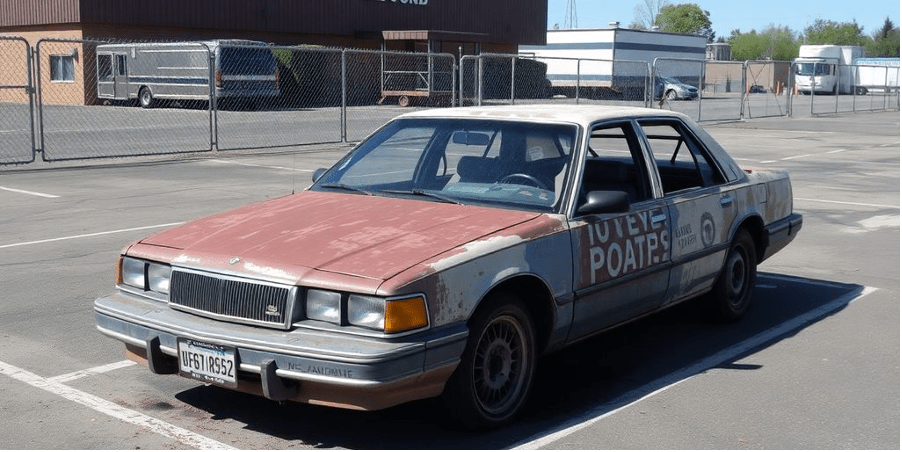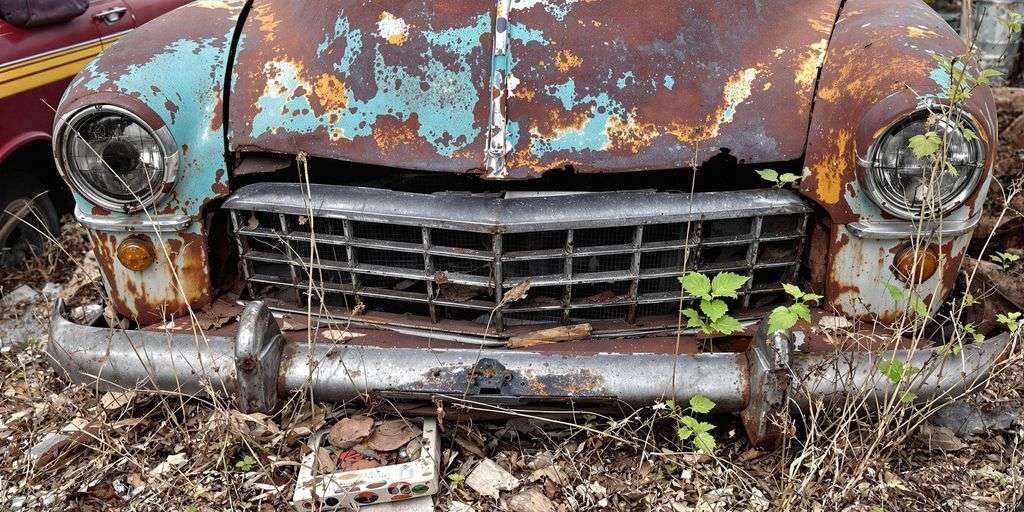Key Takeaways
- Selling an impounded junk car is possible, but requires following legal procedures.
- You'll need to verify ownership and settle any outstanding debts before selling.
- Gather all necessary documents, including the title and a bill of sale.
- Inform your insurance company about the sale to avoid future complications.
- Expect to negotiate, as offers may be lower than market value due to the car's condition.
Understanding the Impound Process
When your car gets impounded, it's more than just a hassle; it's a process that involves several steps and potential costs. Here’s a breakdown of what you need to know.
Reasons for Car Impoundment
Cars can be impounded for a variety of reasons, each with its own set of challenges. Common reasons include:
- Parking Violations: Leaving your car in a no-parking zone or exceeding the time limit can lead to impoundment.
- Unpaid Fines: Accumulating unpaid traffic tickets might result in your car being towed away.
- Driving Without Insurance: If you're caught driving without valid insurance, your car might be impounded on the spot.
Understanding why your car was impounded can help you address the issue more efficiently.
Legal Requirements for Release
Once your car is in the impound lot, getting it back involves meeting certain legal requirements. You typically need to:
- Provide proof of ownership, like your car's title or registration.
- Show valid identification, such as a driver's license.
- Pay any outstanding fines related to the impoundment.
These steps ensure that the vehicle is released to the rightful owner and that all legal obligations are met.
Potential Fees and Charges
Impoundment isn’t just inconvenient; it can be expensive. Here’s a quick look at potential costs:
- Towing Fees: The initial cost of towing your car to the impound lot.
- Storage Fees: Daily charges for keeping your car in the impound.
- Administrative Fees: Additional charges for processing paperwork and handling the impoundment.
Getting your car out of impound quickly can save you money, as fees often accumulate daily.
For more detailed steps on reclaiming your impounded vehicle, check out our guide on reasons a car may be towed and impounded.
Legal Considerations for Selling an Impounded Junk Car
Ownership Verification
Before you even think about selling your impounded junk car, the first thing on your checklist should be verifying ownership. You need to prove that the car is actually yours to sell. This usually means having a clear and valid title in your name. If your car is under a loan or lease, you'll need to sort out any financial obligations first. Without the title, you're stuck.
Outstanding Liabilities
When your car's been impounded, there might be some debts hanging over it. These could be unpaid tickets, storage fees, or other charges. Clearing these liabilities is crucial before you can sell the car. If you owe money, the impound lot won't release the car, and you can't sell what you don't have access to. Make sure to settle these debts to move forward.
Transfer of Title
Once you've confirmed ownership and handled any liabilities, it's time to transfer the title. This step is key in making the sale official. Fill out the necessary sections of the title, including the odometer reading if required, and sign it over to the buyer. Selling a car to a junkyard involves this step to ensure the legal transfer of ownership. Remember, without a properly transferred title, the sale isn't legitimate, and you could still be liable for the car.
Selling an impounded junk car might seem like a hassle, but taking care of these legal steps ensures you won't face any nasty surprises later. It's all about making sure everything's above board and you're not leaving any loose ends.
Preparing Your Junk Car for Sale

Assessing the Car's Condition
Before you think about selling your impounded junk car, take a moment to evaluate its condition. Is it just a bit worn out, or is it really at the end of its life? Check for major issues like engine problems, transmission failures, or extensive rust damage. Knowing the state of your car helps set realistic expectations for its sale price. You might want to get a mechanic's opinion or even a basic inspection to understand what you're dealing with.
Gathering Necessary Documentation
You'll need to gather all the paperwork related to your car. This includes the title, registration, and any previous repair records. If the car's been impounded, make sure you have the impound notice. Having all these documents handy makes the selling process smoother and builds trust with potential buyers. Missing papers? Reach out to your local DMV to see what can be done.
Setting a Realistic Price
Pricing a junk car can be tricky. You want to get something out of it, but you also need to be realistic about its value. Consider the car's make, model, age, and condition. Look at similar vehicles in junkyards or online listings to get an idea of what others are asking. A fair price attracts more buyers and helps you sell the car faster.
Selling a junk car that’s been impounded might seem daunting, but with the right preparation, you can turn a challenging situation into an opportunity. Focus on what you can control, like gathering documents and setting a fair price, to make the process as smooth as possible.
Navigating the Sale Process
Finding a Buyer
Selling an impounded junk car isn't impossible, but it takes some effort. Start by checking online marketplaces and local junkyards for interested buyers. Be transparent about the car's impounded status to avoid any misunderstandings later. You might also consider reaching out to car enthusiasts or mechanics who might see value in the car's parts.
Completing the Bill of Sale
Once you've found a buyer, the next step is to complete a bill of sale. This document is crucial as it legally transfers ownership from you to the buyer. Make sure to include details like the car's make, model, VIN, and sale price. You can find templates online to guide you.
Notifying the DMV
After the sale, it's important to notify the DMV of the change in ownership. This step helps protect you from any future liabilities related to the car. Typically, you'll need to fill out a release of liability form and submit it to the DMV. It's a straightforward process, but don't skip it.
Insurance Implications When Selling an Impounded Car
Understanding Impound Insurance Policies
When your car is impounded, navigating insurance can get tricky. Most annual car insurance policies don't cover impounded vehicles because they're seen as high-risk. Annual car insurance policies often have specific exclusions for cars that end up in the pound. It's crucial to check your policy to see if any exceptions apply.
Informing the Insurance Company
Once you decide to sell your impounded car, inform your insurance provider. This step is vital to prevent future complications. Let them know the car's current status and location. This transparency can help avoid any disputes about coverage later on.
Short-Term Insurance Options
If you're selling the car, the new owner will need insurance to get it out of the impound lot. Often, a short-term insurance policy is the best bet. These policies are typically cheaper and can be tailored to cover the specific scenario of an impounded vehicle. The new owner should ensure their policy includes coverage for releasing the car from the pound, as not all do.
Selling an impounded car may seem daunting, but with the right insurance steps, you can simplify the process and avoid unnecessary headaches.
Collecting the Car After Sale
Coordinating with the Buyer
After selling your impounded junk car, the next step is to coordinate with the buyer for collection. It's important to go to the impound lot together, ensuring all necessary documents are in order. You’ll need your ID, the impound notice, and proof of address. The buyer should bring the bill of sale, insurance papers, and the V5C/2 form. Ensure all paperwork is accurate to avoid any hiccups.
Paying Impound Fees
Before the car can be released, all outstanding fees must be settled. This includes storage charges and any additional costs, like a road fund license if the car isn't taxed. It's wise to discuss who will cover these fees with the buyer beforehand. Sometimes, these costs can be negotiated as part of the sale price.
Arranging Transportation
Once everything is squared away with paperwork and fees, you’ll need to plan how the car will be moved from the pound. If the car isn’t roadworthy, or lacks an MOT, you’ll need to arrange for it to be towed. It's a good idea to schedule this in advance to avoid delays. Consider using a professional towing service to ensure the car is transported safely.
Selling a junk car that’s been impounded can seem daunting, but with the right preparation and clear communication with the buyer, it can be a smooth process. Sometimes, getting any amount from a junk car is better than letting it sit in the impound indefinitely.
Potential Challenges and Solutions

Dealing with Low Offers
Selling a junk car that's been impounded can be tough, especially when buyers know you're eager to sell. They might throw lowball offers your way. Don't rush into a sale. Take your time to compare offers from different buyers. Consider reaching out to junkyards or scrap dealers who might offer a better price. Keep in mind that even a small increase in price can make a difference.
Handling Legal Disputes
Legal issues might crop up, especially if there are any disputes over ownership or outstanding fines. Make sure you have all the necessary paperwork, like the title and any release documents from the impound lot. If a legal dispute arises, it might be wise to consult with a legal professional to understand your rights and obligations.
Ensuring a Smooth Transaction
Selling an impounded car involves a bit more paperwork than usual. Here's a quick checklist to keep things on track:
- Verify the buyer's credentials and ensure they are legitimate.
- Complete the bill of sale with all necessary details.
- Notify the DMV about the sale to avoid future liabilities.
A little preparation goes a long way in making sure the sale goes off without a hitch. Double-check everything, and you'll save yourself a lot of hassle down the road.
Wrapping It Up: Selling Your Impounded Junk Car
So, there you have it. Selling a junk car that's been impounded isn't impossible, but it sure does come with its own set of hoops to jump through. You gotta make sure all the paperwork is in order, like the bill of sale and the V5C logbook. Plus, don't forget about the insurance bit—it's crucial to let the insurance company know the car's in a compound. And yeah, you might not get top dollar for it, but hey, something's better than nothing, right? Just remember, every police authority might have its own little quirks in the process, so it's always a good idea to double-check the specifics with them. Good luck, and hopefully, this helps you get that old clunker off your hands!
Frequently Asked Questions
Can I sell my car if it's impounded?
Yes, you can sell your car even if it's impounded. However, the sale must be genuine and follow all legal procedures.
What documents do I need to sell an impounded car?
You'll need the bill of sale, your ID, proof of address, and the car's registration documents.
Do I have to pay fees to release the car from the impound lot?
Yes, you'll need to pay any outstanding fees, including towing and storage charges, before the car can be released.
Can someone else pick up the car for me after it's sold?
Yes, but you'll need to provide them with the necessary documents and confirm the sale with the impound staff.
Should I inform my insurance company about the sale?
Yes, it's important to notify your insurance company once the car is sold to avoid any future complications.
What if I have a loan on the car?
You'll need to settle any outstanding loan before you can sell the car. Contact your finance company for the payoff amount.



